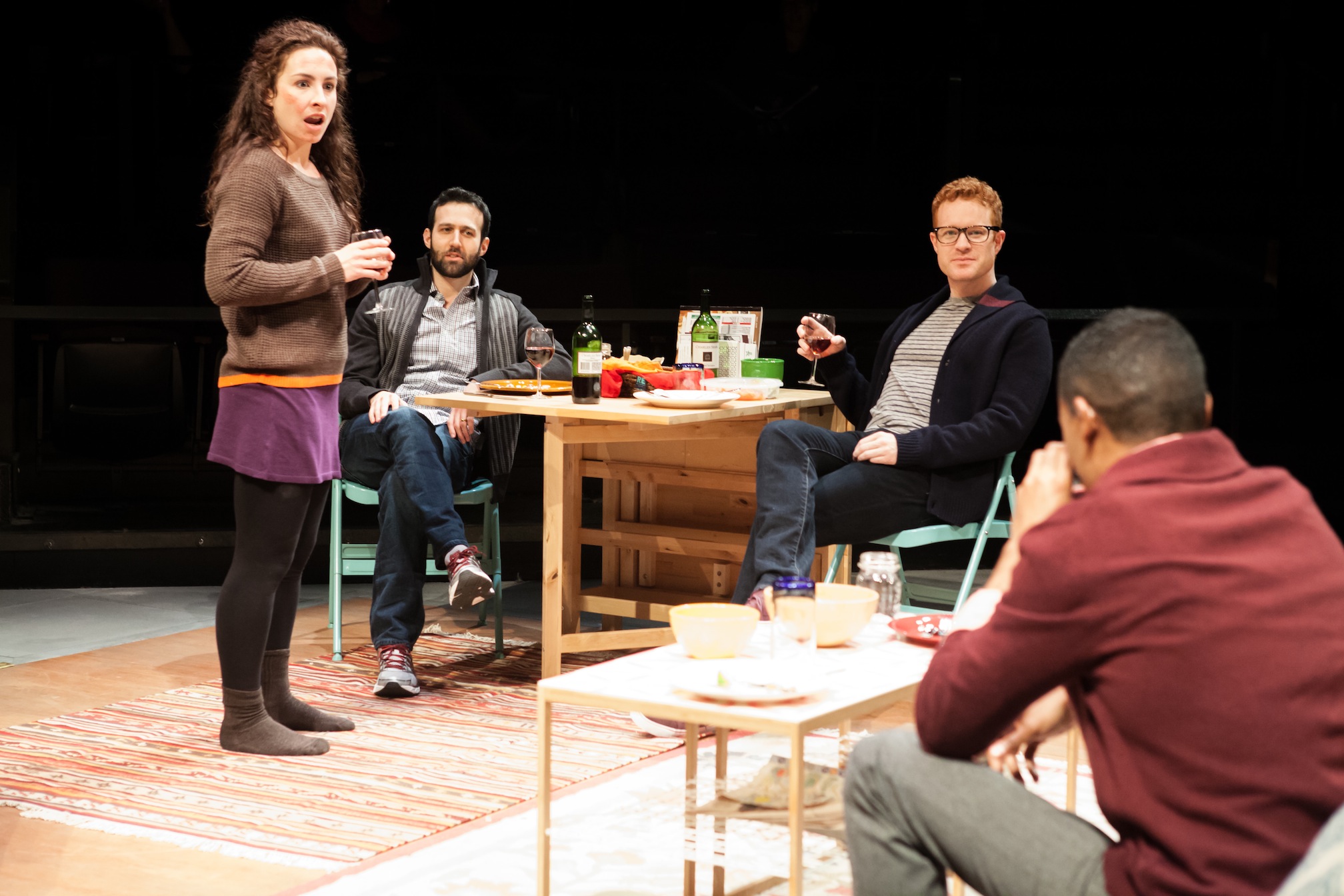| Casandre Elyse Medel, Ian Weber & Michael Mayes in Edgewise. Photo – Theatre[502]. |
Edgewise
By Eliza Clark
Directed by Mike Brooks
A review by Carlos-Manuel
Entire contents copyright © 2013 Carlos-Manuel. All rights reserved.
Since its inception, Theatre [502] has challenged audiences to question everything, from its existence in the universe and the meaning of life to our purpose in the world and the cause and effect of our actions. This is one of the many reasons I like Theatre [502]. They are not afraid to challenge our intellect, our fears, our convictions and beliefs. The company dares to go where most theatre companies dare not.
Another thing I like about Theatre [502] is that, so far, the acting tends to be some of the best around town. That also goes for the artistic values of their productions and for the professionalism the members of the company show at every event. But as the saying goes, “Not everything that shines is gold.”
Edgewise by Eliza Clark is the company’s second play in their third season, and like the plays before this one, it is loaded with philosophical and ethical questions.
The story revolves around three teenagers who work at a fast food burger joint in New Jersey and the decisions they have to make in order to survive in a United States that is under siege by “the enemy,” which in this case seems to be every person who isn’t a patriot.
The entire story takes place within the burger joint: behind the counter and the storage room. This is important to note because the environment outside the building is supposed to be chaotic and unsafe due to the non-stop airstrikes and the many shootings. In other words, New Jersey is an actual battlefield. And here lies my problem, first with the script, then with the production.
The playwright places three teenagers in the middle of a battlefield crisis, where the only “safe space” seems to be the burger joint itself, and the outside world seems to be a constant threat; having a bloody, injured man – who could be the enemy – showing up at the restaurant raises the stakes in the story. Immediately, the alpha of the three teenagers (a funny Michael Mayes as Ruckus) takes matters into his hands and decides the stranger (Eli Keel as Louis) is an untrustworthy individual and must be dealt with. While I was able to accept Ruckus’s decision, I just couldn’t believe, as much as I tried, that the other two teenagers would follow along with the plan, especially when nothing is truly forcing them (although they state otherwise) to stay. Still, I tried to suspend my disbelief as much as possible to go alone with the story. Yet, at the end, I couldn’t buy the product.
Then I realized why. It was the direction (naturalistic) and the lack of truly understanding what it really means to be in the middle of danger that kept me from buying into the play’s premise. I’m not sure if any of the actors or the director have ever been in a true battlefield or in a place where you have to run and hide because riots are happening left and right and you fear for your life, or in a town/country where unexpected gunfire happens as you are walking down the street. I don’t think the actors have ever been in such situations and I pretty much doubt the director has ever experience such realities, except in movies and video games. And if they have, they forgot to recall the horror, the fear, and the constant uneasiness of knowing that you might get unexpectedly shot or captured. Trust me, that uneasiness, and fear, and incertitude makes you a very nervous individual, trusting no one, especially those around you. And in my case, it also takes years of counseling to overcome such traumas.
I bring this up because the playwright’s desire to place the teenagers in such a situation, although seemingly a good idea, at times fails because some of the story’s inconsistences. Emma (Casandre Elyse Medel), for example, makes an attempt to go home but never does because “she is being forced” by Ruckus to stay. Yet, there is really no true evidence (physical or emotional) to support this intimidation. Perhaps the playwright’s intentions were to use the outside forces to keep Emma in the burger joint but it never really feels that the character is ever in danger. Besides, a few times Emma and Marco (Ian Weber) go to their cars, which are parked outside, and several costumers used the drive-thru to order their meals, indicating the fact that life outside the restaurant isn’t really that dangerous. Still, there are airstrikes happening throughout the day, injured people being tortured, unexpected guests becoming a threat, and at least two teenagers capable of killing each other if necessary. Yet, with all these factors surrounding the story and the characters, it all felt completely artificial.
Don’t get me wrong. The actors did a fantastic job, especially Michael Mayes as Ruckus. Ian Weber, as Marco, truly portrays the internal angst of an introvert/insecure teenager; and Casandra Elyse Medel stood her ground as the worried but easy-to-manipulate female in the cast. Then there was the work of Eli Keel as Louis and JohnBen Lacy as Paul, both presenting characters that brought some uneasiness to the situation.
Yet, as mentioned before, it was the directing that bothered me the most. Because while the actors knew their characters inside out (and I’m sure thanks to the director working with them), the blocking and line delivery were perfect, I cannot help but feel that the immediacy of danger, the tension felt in threatening situations, and the fear of being trapped was never truly palpable. To me that has to do with a tone that was too relaxed or naturalistic, if you will, rather than filled with intensity and fear.
Still, the audience laughed and so did I. And there were even some people who jumped out of their seats or covered their eyes when hearing or witnessing some of the characters’ actions. But like in an action flick, those were just the results of the special effects, which in this production seem to be what the director relied on because, as he states in the program, “These are characters that are immediately recognizable and relatable, even if their circumstances and choices are not” – hence, my issue with both the script and the production.
As I watched Edgewise, I couldn’t help but be reminded of another play with a similar premise, Death and the Maiden by Chilean playwright Ariel Dorfman. In this play, like in Edgewise, we don’t really know who is telling the truth, who is a liar, and who is victim or enemy. Yet, unlike Edgewise, the characters’ situations and their gruesome actions are right in your face, with no apology, placing the audience in an unnerving situation and likely to make anyone feel angry and helpless. That tension and fear is exactly what was missing from this production. Instead, we are presented with a clearly calculated production that feels like a sanitized experiment where the actors could go “all the way” but dare not to because it could be too real for an American audience.
Edgewise
August 16, 17, 19, 22, 23, 24
8 p.m.
$15
8 p.m.
$15
Theatre [502]
At The Clifton Center
2117 Payne Street
Louisvile, KY 40206

![Theatre [502] Attempts a Thriller in "Edgewise"](https://arts-louisville.com/wp-content/uploads/2013/08/Casandre-Elyse-Medel-Ian-Weber-Michael-Mayes-in-Edgewise.-Photo-Theatre502..jpg)



